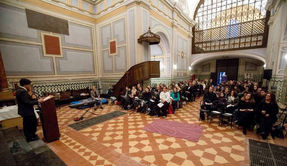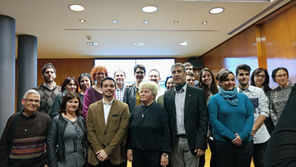Dr. Julio Levit Koldorf is a scholar of communication, politics, and contemporary antisemitism whose work examines the crisis of values and the ideological fragmentation defining the moral and intellectual condition of the modern West. With over fifteen years of international experience across academia, diplomacy, and civil society, his intellectual and professional trajectory has been driven by a central preoccupation: the problem of ideology — how systems of belief conceived to offer meaning and moral orientation, have evolved into mechanisms of polarization, resentment, and historical distortion.
Trained as a communication specialist and political theorist, Dr. Levit Koldorf built a career that bridged institutional, governmental, and academic domains. He collaborated with governments, NGOs, and international organizations in projects addressing discrimination, education, and cultural policy. At the Institute for Monitoring Peace and Cultural Tolerance in Education (IMPACT-se), he directed a research project in cooperation with UNESCO that examined the presence of antisemitism in European educational materials.
Dr. Levit Koldorf completed his postdoctoral research within the prestigious European Union–Next Generation program, in a consortium formed by the University of Valencia, University of Zaragoza, National University of Rosario, and Oxford University, where he developed a theoretical framework to understand contemporary political antisemitism as both a symptom and a catalyst of the wider ideological crisis afflicting Western democracies.
He was a member of the Research Group in Critical Theory at the Institute for Creativity and Educational Innovations of the University of Valencia, and a researcher at the Chair on the Holocaust and Other Forms of Discrimination at the National University of Rosario in Argentina. His earlier doctoral work, jointly undertaken at the University of Zaragoza, University of Barcelona, and funded by Banco Santander, investigated the communicative strategies by which ideological movements construct moral legitimacy and symbolic power within the public sphere.
From 2016 to 2019, Dr. Levit Koldorf served as Director of Communication and Public Relations at Sefarad Aragón in Spain, leading educational and cultural initiatives to combat antisemitism and promote interfaith dialogue. Between 2019 and 2021, he worked with the diplomatic and consular corps of the Kingdom of Spain in Germany, where he contributed to institutional communication strategies and the promotion of intercultural cooperation.
Prior to his move to Europe, he served as Assistant Professor at the School of Social Communication of the National University of Rosario, where he also participated in the Research Institute on Contemporary Philosophical-Political Problematics. His early academic years, dedicated to teaching and research in political communication, laid the foundation for his enduring intellectual orientation — a critique of ideological absolutism and the moral exhaustion of modern politics, expressed through his research on antisemitism, propaganda, and the communicative anatomy of extremism.
Throughout his scholarly and journalistic work, Dr. Levit Koldorf has argued that antisemitism is not a mere prejudice but a structural mirror of Western decline — a recurring ideological pathology that exposes how societies lose their sense of moral proportion. His research situates antisemitism at the crossroads of political radicalization, populist rhetoric, and the erosion of universal humanist values. He maintains that the new ideological environment of the 21st century — dominated by moral relativism, cultural tribalism, and the ideologization of facts and history— has reactivated ancient hatreds under progressive and populist veneers, transforming both the far-right and the far-left into distorted reflections of one another in their hostility toward Jews, liberal democracy, and the Enlightenment tradition.
A frequent contributor to international outlets such as The Jerusalem Post, The Jewish News Syndicate and The Times of Israel, among others, Dr. Levit Koldorf has explored in his writings the intersection between ideology, communication, and the civilizational crisis of the West. His essays emphasize that the ideological polarization of our time is not merely political but existential — a collapse of meaning wherein certain narratives have become indistinguishable from the dogmas they once resisted.
Dr. Julio Levit Koldorf’s intellectual mission has been to expose the moral and communicative mechanisms through which ideology corrupts truth, distorts, and undermines universality. His work calls for a reawakening of critical thought, historical awareness, and ethical clarity as the indispensable foundations of Western civilization.




















